Sponsored Content by CSL LtdNov 30 2016
How common is iron deficiency and who does it affect?
Iron deficiency is, in fact, one of the most common nutritional disorders. It affects between three and five billion people, which is between half and two-thirds of the world population (about seven billion).
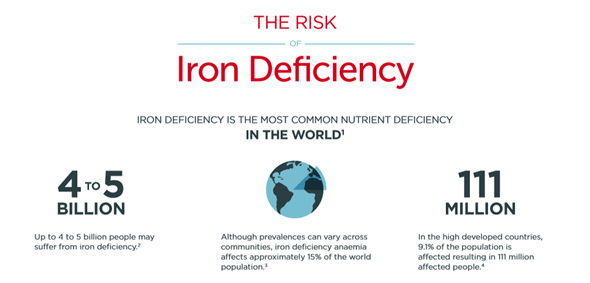
Iron deficiency anemia is a subset of iron deficiency, that is about two billion people according to the WHO. It affects people throughout the globe, in a more prevalent way in developing countries, but it is also a very highly prevalent disease in developed countries.
What’s the difference between iron deficiency and iron deficiency anemia?
Anemia is a disease in which you have a deficit in the production of hemoglobin. Two-thirds of anemias are due to iron deficiency, but not all anemias are due to iron deficiency.
Anemia is this lower level of hemoglobin. Iron deficiency is a deficit in iron, which could be a pure deficit or a functional deficit of iron, meaning that the iron that's available in your body will not satisfy the needs of your body to function.
Iron is part of a number of metabolic processes, including the production of energy at the metabolic level for the production of ATP, which is the main source of energy used by the cell. It is a very important part of our normal metabolism in general, particularly for muscles including skeletal muscles as well as myocardial.
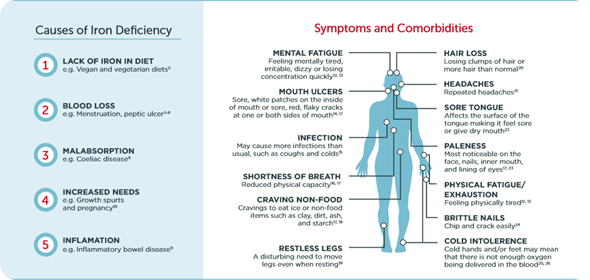
What are thought to be the main causes of iron deficiency?
Iron deficiency is a nutritional disorder, first and foremost, particularly in developing countries, but it is also associated as a comorbidity with many diseases. It can be sometimes difficult to determine which is the chicken and which is the egg!
In all inflammatory processes iron is less available to the body, so even if you have iron, you have functional iron deficiency. When you have a shortage of iron which can be through your nutrients and everyday intake, then you can have absolute iron deficiency.
It is also caused by bleeding, each time you have bleeding, you are losing hemoglobin and so losing iron, which is the important part of hemoglobin, of course.
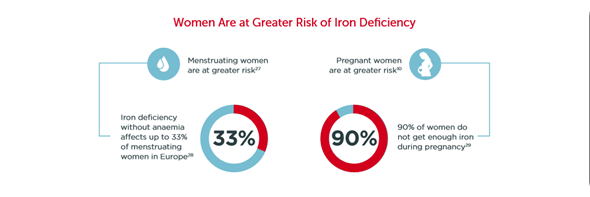
Can anemia be exacerbated by infectious diseases?
Anemia can be caused by infectious diseases. Infectious diseases can exacerbate almost all other comorbidities. When you suffer from infectious diseases, your ability to fight infectious diseases will be lowered by the fact that you have less oxygen delivered to your own body, so yes, it can.
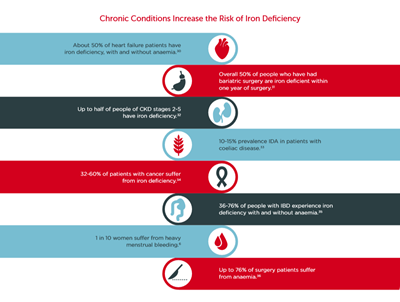
What are the main health consequences of anemia?
Anemia affects the whole functioning of your body. Hemoglobin is what transports oxygen to your tissues. All the tissues in your body, starting with your brain, your heart, everything functions because you are delivering oxygen constantly to those organs. As you decrease this ability because you have anemia, then the organs’ function is decreased.
Iron deficiency works in a different way as it affects more the metabolism of the cell itself, as I was explaining earlier.
In both cases, you will have a decrease of your functional abilities, which results in fatigue; inability to work and by a decrease of your own productivity.
What impact does iron deficiency have globally?
Iron deficiency and iron deficiency anemia have a personal impact on patients. We can easily understand that at the level of the societies, you have an important decrease of productivity, and it equates, for example, to about four percent of the GDP in developing countries.
This is the physical and cognitive losses. The productivity losses link to physical and cognitive deficiency, that is leaning towards this loss of GDP.
Also the WHO are estimating that in developing countries, if we were to correct iron deficiency anemia, iron deficiency, the social productivity could improve as much as twenty percent. This would be a big impact on society. An impact that is close to the aggregate of diabetes, asthma, and cardiovascular diseases altogether.
What can be done to tackle iron deficiency?
Many things can be done to tackle iron deficiency.
In terms of practical things, you can supplement iron, either orally or intravenously (intravenously when it doesn't work orally). That is the simple answer.
However, there is a much more complex answer behind it, because it is a very underestimated condition, even when we proofs and evidences about the importance of iron deficiency and iron deficiency anemia. Even if anemia is well understood, it's still poorly treated. Iron deficiency is even worse and frequently not diagnosed.
We all have a role in educating and helping people better understand their conditions, better understand their disease, and better understand also that there are treatments that are available to them.
The whole educational process around patient's awareness of their own diseases, iron deficiency, iron deficiency anemia, but also the awareness of the physicians, because they very often overlook iron deficiency.
Even when they diagnose anemia, they are tolerating low level of hemoglobin. Of course it is easy for the physician to tolerate this low level of hemoglobin.
It's a very different story for the patient. This is where we have, for many years, as the leading expert in iron supplementation, engaged in supporting physicians and patients to better diagnose and treat iron deficiency and iron deficiency anemia., it's an endeavor that will continue for a long time.
What advances have been made in recent years?
The most important one is the level of evidence of what happens in cardiology and particularly in heart failure. We have now carried out a number of clinical trials that have demonstrated the value of correcting iron deficiency with or without anemia. It's an independent risk factor, in patients that are suffering from congestive heart failure.
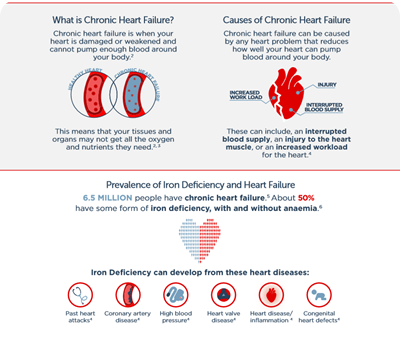
Earlier this year, at the Heart Failure Association (HFA) meeting in Florence, we had an update of the European Society of Cardiology (ESC) guidelines. These guidelines are issued every fourth year.
They are now recommending the use of Ferric Carboxymaltose to correct iron deficiency in heart failure. . They are recommending that iron deficiency is being diagnosed and treated in every new patient diagnosed with heart failure.
We are also looking at even more evidence around mortality and rehospitalization for the future.
This is a great advancement in the sense that we have now highlighted that for patients that are well treated for their heart condition, receiving the primary treatment recommended by the European Society of Cardiology, correcting this patient for iron deficiency, and one out of two is iron deficient, you will further improve their outcome. This is well established and supported by high level evidence now.
We have similar recommendations in both gastroenterology, with the ECCO guidelines, where they're also recommending the use of IV iron, as well as in the KDIGO guidelines, which are nephrology guidelines where equally, there is a recommendation for IV iron for the treatment of iron deficiency, iron deficiency anemia.
It's not the various level of awareness that is zero, because the guidelines are there already. Despite the guidelines, there are still a low level of treatments on patients. Part of our challenge is, for example, that we are engaging in right now is how do we make sure that guidelines are well implemented and well applied.
How much work still needs to be done to tackle iron deficiency across the world?
If I knew, I would gladly tell you, but it is a lot! So many things need to be done. It is starting with hygiene, with good nutrition in many countries where you have iron deficiency, driven by nutritional deficit.
Organizations, like WHO and UNICEF, are extremely engaged in tackling iron deficiency because they recognize it as the most prevalent nutritional deficit.
In the chronic disease associated iron deficiency , so where patients are further impacted , like heart failure, IBD and other gastrointestinal diseases, it is the education of the patient themselves as well as the education of the physicians, and the fact that we shouldn't tolerate to have those patients under treated.
They shouldn't tolerate to be under treated. It's all the education and awareness that goes along with that, so that they can receive either oral or IV iron based on whatever will suit their needs.
What is Vifor Pharma’s vision?
We strive for excellence in our field of expertise to make a difference in patient's lives. We aim to engage alongside patients and health care providers and other care givers so that the disease will be recognized earlier, diagnosed correctly and then treated correctly.
Currently not even half of people with iron deficiency are being diagnosed. Not even half of them treated by oral, and a small section is treated with IV iron. When you look at those gaps between the different situations, you understand the work that we have ahead of ourselves in our quest for bringing solutions to all those patients that have iron deficiency and iron deficiency anemia.
To summarize, iron deficiency is an under recognized, underappreciated disease, and as a result, under diagnosed and under treated. As we now have evidence of the importance of correcting that, whether in developing countries through all the alimentation solutions as well as in developed countries that are treating patients that have comorbidities, this is the most important thing that anybody needs to understand.
People who are also suffering from those unspecific symptoms like fatigue, brittle nails, hair loss, these are very unspecific symptoms of iron deficiency and iron deficiency anemia.
If physicians and patients recognized it better and were at that time looking for iron indicators in the blood, (ferritin and TSAT, which is transferrin saturation), they would discover the deficiency, and they would be able to treat it.
Where can readers find more information?
About Dr Thierry Teil
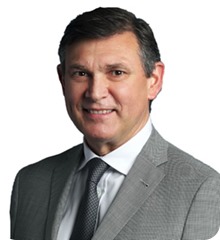 Global Head Medical Affairs, Vifor Pharma
Global Head Medical Affairs, Vifor Pharma
Education:
- M.D., University of Lyon Claude Bernard, Lyon, France
- MBA, IGS (Institute de Gestion Sociale), IMIS (Institute of Management for Health Industries), Lyon, France
Professional career:
- 1989 - 2002: Aventis and parent companies: Roles as country manager (Indian Ocean and Vietnam) and Global Marketing & Medical Affairs (Anti-infectives and respiratory), Global Business Team Leader Cardiology, Head of Marketing and Sales (UK, Spain, Italy), Global Project Leader Customer Relationship Management
- 2002 - 2004: Chief Operating Officer, International Regenerative Medicine, Westfield, NJ, USA
- 2004 - 2006: Head of Alliance Management, ACS Project Leader, The Medicines Company, Parsippany, NJ, USA
- 2006 - 2014: UCB S.A. in the following functions:
- 2009- 2014: Managing Director Russia-CIS, Moscow, Russia
- 2006 – 2009: Head of Global Medical Affairs, Brussels, Belgium
- 2014 - 2015: Head of Global Medical Affairs, NPS Pharma, Maidenhead, UK
- 2009 - 2016: Acting Chief Medical Officer (06/2015-03/2016), NED Board Member & Strategic Advisor, Peptinov SAS, Paris, France
- Since March 2016: Head Global Medical Affairs, Vifor Pharma